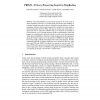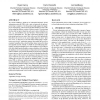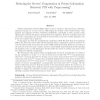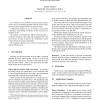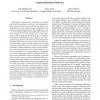232
click to vote
PET
2012
Springer
13 years 4 months ago
2012
Springer
We present PRISM, a privacy-preserving scheme for word search in cloud computing. In the face of a curious cloud provider, the main challenge is to design a scheme that achieves pr...
132
click to vote
CCS
2011
ACM
14 years 2 months ago
2011
ACM
We extend Goldberg’s multi-server information-theoretic private information retrieval (PIR) with a suite of protocols for privacypreserving e-commerce. Our first protocol adds ...
124
click to vote
CC
2006
Springer
15 years 2 months ago
2006
Springer
We show that any 1-round 2-server Private Information Retrieval Protocol where the answers are 1-bit long must ask questions that are at least n - 2 bits long, which is nearly equa...
113
click to vote
PKC
2010
Springer
15 years 6 months ago
2010
Springer
A fundamental privacy problem in the client-server setting is the retrieval of a record from a database maintained by a server so that the computationally bounded server remains ob...
130
click to vote
PET
2010
Springer
15 years 6 months ago
2010
Springer
We explore how Private Information Retrieval (PIR) can help users keep their sensitive information from being leaked in an SQL query. We show how to retrieve data from a relational...
108
click to vote
CCS
2010
ACM
15 years 6 months ago
2010
ACM
Private Information Retrieval (PIR) protocols allow users to learn data items stored at a server which is not fully trusted, without disclosing to the server the particular data e...
115
click to vote
CRYPTO
2000
Springer
15 years 6 months ago
2000
Springer
Private information retrieval (PIR) enables a user to retrieve a data item from a database, replicated among one or more servers, while hiding the identity of the retrieved item. ...
102
click to vote
GI
2001
Springer
15 years 6 months ago
2001
Springer
In e-commerce, the protection of user privacy from a server was not considered feasible until the private information retrieval (PIR) problem was stated recently. A PIR protocol a...
130
click to vote
EUROCRYPT
2004
Springer
15 years 7 months ago
2004
Springer
We revisit the following open problem in information-theoretic cryptography: Does the communication complexity of unconditionally secure computation depend on the computational com...
126
click to vote
NDSS
2008
IEEE
15 years 8 months ago
2008
IEEE
Traditionally, techniques for computing on encrypted data have been proposed with privacy preserving applications in mind. Several current cryptosystems support a homomorphic oper...
